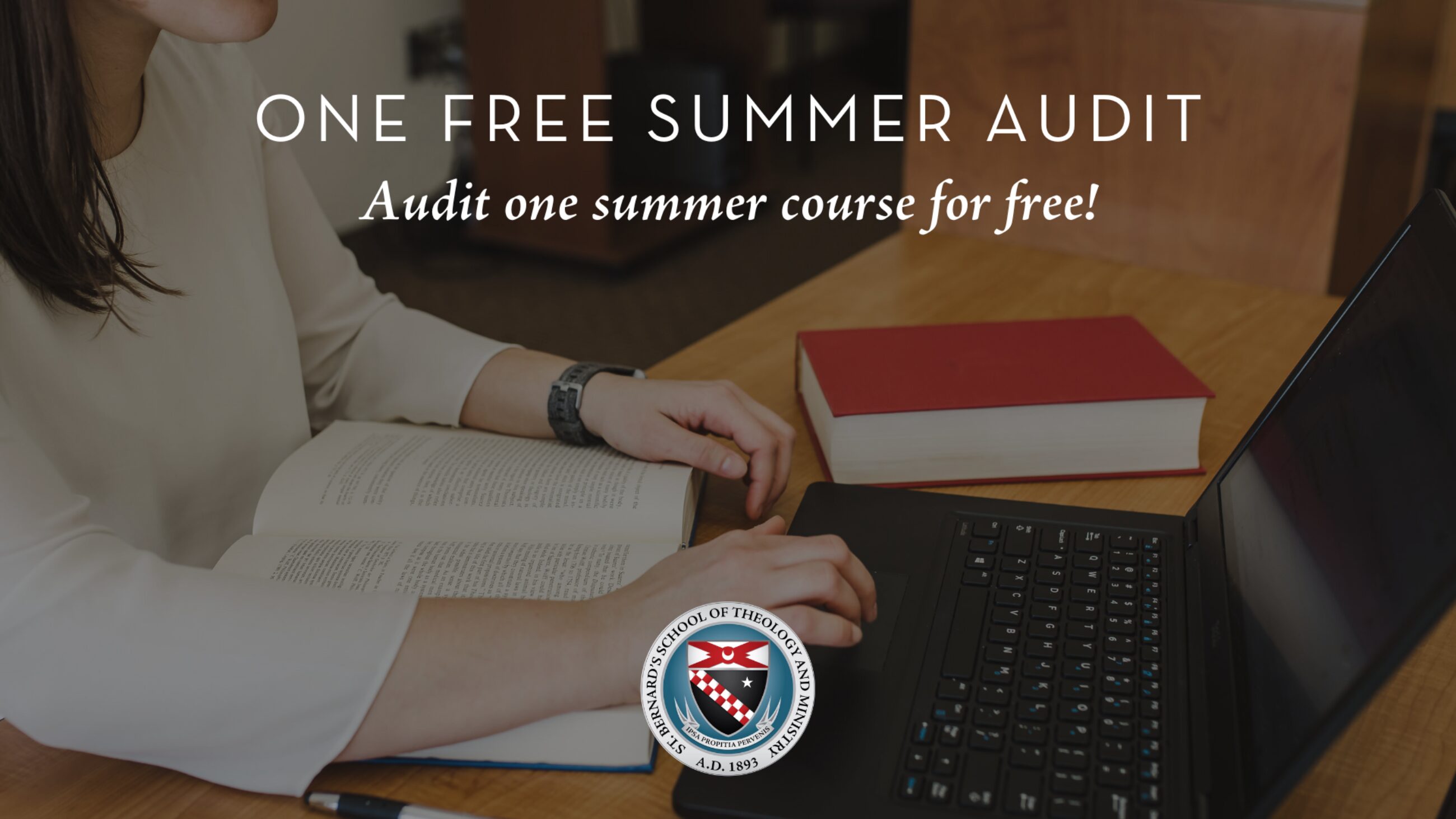Thanks to the generous support of the Knights of Columbus Finger Lakes Chapter, St. Bernard's is delighted to offer the opportunity of auditing one summer course for free. We are a Catholic graduate school committed to featuring courses that enhance the truths of our faith, and as such, wish to share our offerings with as many people as possible.

The location of a course is designated below by one of four geographic areas, indicating the location from which the live course is taught. Students who are within commuting distance to that location are encouraged to attend class in person. All Catholic theology courses online can be accessed synchronously for those unable to attend in person or not in commuting distance. Live course times are listed in Eastern Standard Time (EST/EDT). Further details on distance learning can be found here.
Summer 2024 Courses
May 13th - June 28th (Session I) | July 1st - August 16th (Session II)
Application deadline for Session I is May 10th; application deadline for Session II is June 28th.
Add/drop deadlines are May 17th [Session I] and July 5th [Session II].
BUF (Buffalo Campus) | ROC (Rochester Campus)
Session II
A205: Introduction to Biblical Studies (Matthew Ramage, Ph.D.)
The sequence of Sacred Scripture courses at St. Bernard’s is meant to instill habits and skills of reading the Bible that will nourish the spiritual life of the student and candidate for ministry. This first course lays a foundation for all other Scripture courses. It intends to head off simplistic and hackneyed interpretations of Dei Verbum and instead to pursue the development of a rigorous ecclesial hermeneutic. Students will learn the practical building blocks and essential theoretical principles for a Catholic theological approach to the interpretation of Sacred Scripture. Topics treated include biblical geography, biblical history, biblical languages, biblical narrative, the framework of theology, textual criticism, historical criticism, biblical canon, patristic interpretation, the four senses of Scripture, philosophical hermeneutics, and Dei Verbum.
3 credits | Online
Mondays, 6:30 - 9:30pm EDT, July 1st, July 8th, July 15th, July 22nd, July 29th, August 5th, August 12th
B/C461: Image of the Maker: The Theological Poetics of George MacDonald and J.R.R. Tolkien (Siobhan Latar, S.T.D.)
The great Catholic myth-writer, J. R. R. Tolkien, maintained that “we make because we are made in the image of a Maker.” He is not the only Catholic literary artist who understood our capacity to create, and more particularly, to create through language, to be a privileged and essential aspect of our human vocation. This course will draw on the penetrating insights of Catholic literary giants such as Paul Claudel, Flannery O'Connor, and J. R. R. Tolkien, as well as Tolkien's mentor, George MacDonald, to examine in more depth the role of creativity in human life. We will uncover both MacDonald and Tolkien’s understanding of the role of creativity and what it shows us about our relationship with creation, ourselves, and the Creator. We will spend time examining both their thought and examples of their own literary work that exemplify and embody the principles to which they testify.
3 credits | Online
Wednesdays, 6:00 - 9:00pm EDT, July 3rd, July 10th, July 17th, July 24th, July 31st, August 7th, August 14th
C/D329: The Gospel of Life: Life Issues and Contemporary Challenges (Matthew Kuhner, Ph.D.)
An exploration of the nature, demands, and consequences of the Gospel of Life, “that 'new' and ‘eternal' life which consists in communion with the Father, to which every person is freely called in the Son by the power of the Sanctifying Spirit…[in which] all the aspects and stages of human life achieve their full significance” (Evangelium Vitae, §1). After beginning with an overview of theological anthropology (centered upon key sources in Scripture and Tradition), the course then addresses moral issues concerning the beginning of life, its end, and each stage in between. These issues include, but are not limited to: abortion, contraception, violence and war, economic injustice, and euthanasia. The general aim of the course is two-fold: (1) to grant the student proficiency in engaging these challenges, and (2) to identify the Church’s teaching on each issue, as well as the foundation of each teaching in the Gospel of Life.
3 credits | ROC and Online
Tuesdays, 6:00 - 9:00pm EDT, July 2nd, July 9th, July 16th, July 23rd, July 30th, August 6th, August 13th
CP661: Philosophical Ethics (Erik van Versendaal, Ph.D.)
This course will articulate the general components necessary to a sustained, unified, and useful investigation into the moral life. With a privilege accorded to the Socratic, Platonic, Aristotelian, Augustinian, and Thomistic traditions, the course will consider the question of human purpose, namely to be happy, and the means that must be marshalled in order to achieve this happiness. Among the components to be examined are the following: how virtue, vice, and habit are related to the development of human character; how do we understand free choice and the many and varied roles that both reason and will play in the realization of a free choice; what is meant by conscience and its role in the moral life; is the society we live in and the friendships we enjoy necessary to the realization of a happy life; can the purely secular approach to human happiness succeed or must this be realized within a religious context?
3 credits | Online
Tuesdays, 6:00 - 9:00pm EDT, July 2nd, July 9th, July 16th, July 23rd, July 30th, August 6th, August 13th


